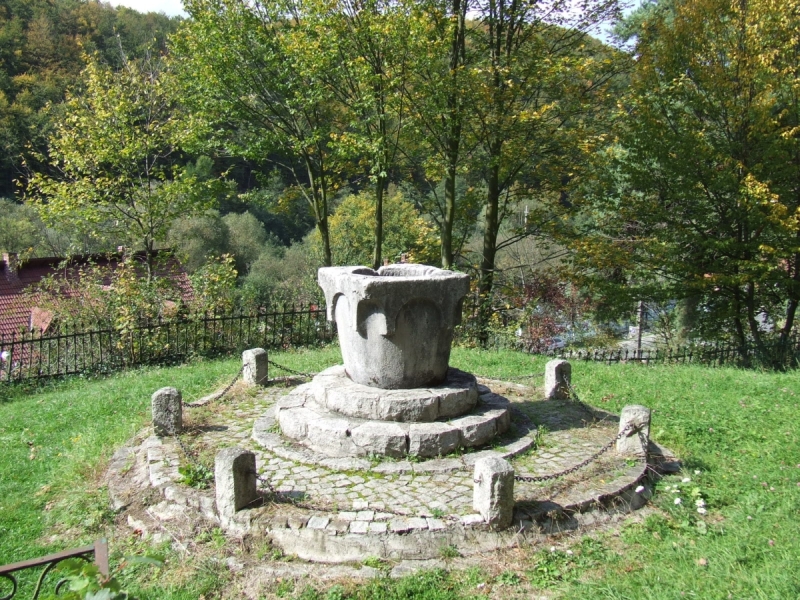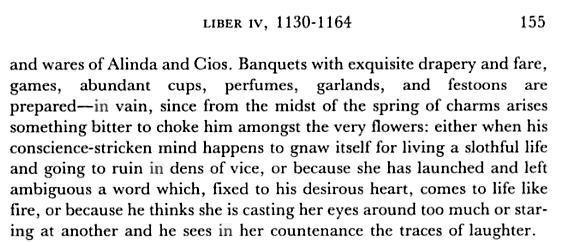Is the Fountain Of Pleasure Tainted? Or Does the Taint Arise In How We Approach It?
Some people seem to like to quote Lucretius out of context, in a way that implies that Lucretius was attacking, rather than following, pleasure as the guide of life. Here’s an example I saw quoted on Facebook today:
Latin: “medio de fonte leporum, surgit amari aliquid, quod in ipsis floribus angat”
English: “from the midst of the very fountain of delight, something bitter arises to vex us even amid the flowers themselves”
Taken out of context, that passage from Book IV appears to be a repudiation of pleasure as the guide. It seems to convey the frustration that pleasure is always poisoned by pain. In fact, these seem to be the words of someone who has swallowed anti-Epicurean views that the faculty of pleasure isn’t “noble” or “worthy.” Such people think that the goal of life is an ambiguous abstraction like “virtue,” and that Lucretius was expressing the futility of pursuing pleasure. From that point, it’s an easy leap to conclude that “avoidance of pain” is all that matters in life.
But if you check the original and refer to the entire passage, it’s easy too see that this observation is not an indictment of pleasure in general, but a warning against pursuing pleasure in a particularly foolish way. As was his norm, Lucretius was pointing out that the trouble is not pleasure itself, but the choice to pursue pleasure in foolish ways. And what makes a way of pursuing pleasure foolish? Turning a blind eye to the consequences that are sure to arise from that choice.
In this case, Lucretius is pointing out the danger that necessarily will arise if one allows oneself to be intoxicated by sexual love with the wrong person. Here’s more of the passage, translated here in “Lucertius On Love And Sex” by Robert Brown:
As one would expect from a philosophy that looks to pleasure as the guide of life, the question comes down to pursuing pleasure in an intelligent manner. And what is the only standard for determining whether the choice of manner of pursuing pleasure is intelligent? Since pleasure is the guide of life (and not “virtue” or any other meaningless or arbitrary standard), the test is whether the choice succeeds or fails in maximizing net pleasure while minimizing the net pain incurred in achieving that pleasure. Here is the way Epicurus expressed it in his letter to Menoeceus:
And since pleasure is our first and native good, for that reason we do not choose every pleasure whatsoever, but will often pass over many pleasures when a greater annoyance ensues from them. And often we consider pains superior to pleasures when submission to the pains for a long time brings us as a consequence a greater pleasure. While therefore all pleasure because it is naturally akin to us is good, not all pleasure is should be chosen, just as all pain is an evil and yet not all pain is to be shunned. It is, however, by measuring one against another, and by looking at the conveniences and inconveniences, that all these matters must be judged. Sometimes we treat the good as an evil, and the evil, on the contrary, as a good.
As a true Epicurean, Lucretius kept the focus on pleasure and ended the passage by pointing out that even in the dangerous field of romantic love, it is possible to choose intelligently. The pleasures of love can be achieved without the pain that comes from choosing the wrong partner:
 Pleasure could not be the guide of life if it was inherently tainted with so much pain that the benefit of pursuing pleasure is necessarily outweighed in all cases. Nature gives us pleasure as a “go” signal and pain as a “stop” signal, and when we read those signals intelligently and pursue pleasure in appropriate ways, the reward is clearly worth the effort and the pain required to obtain it. It is when pleasure is pursued foolishly that pain overwhelms the effort and makes it counterproductive. As the Epicurean speaker in Cicero’s “On Ends” stated:
Pleasure could not be the guide of life if it was inherently tainted with so much pain that the benefit of pursuing pleasure is necessarily outweighed in all cases. Nature gives us pleasure as a “go” signal and pain as a “stop” signal, and when we read those signals intelligently and pursue pleasure in appropriate ways, the reward is clearly worth the effort and the pain required to obtain it. It is when pleasure is pursued foolishly that pain overwhelms the effort and makes it counterproductive. As the Epicurean speaker in Cicero’s “On Ends” stated:
No one rejects, dislikes or avoids pleasure itself, because it is pleasure, but because those who do not know how to pursue pleasure rationally encounter consequences that are extremely painful.
Thus the intelligent Epicurean does not adopt a stoic attitude of contempt toward pleasure. The Epicurean does not see the fountain of pleasure as tainted. The Epicurean sees pleasure as fountain which serves as the guide of life, and – in order to best enjoy the fountain of pleasure, he approaches that fountain using the test stated in Vatican Saying 71:
71. Question each of your desires: “What will happen to me if that which this desire seeks is achieved, and what if it is not?”



